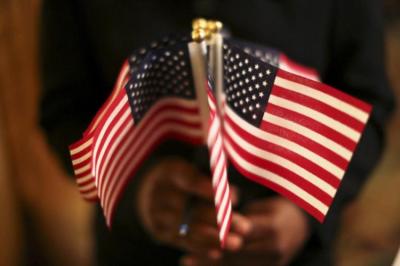Why Flag Day is as important as July 4th

Flag Day is one of those national holidays that tend to surprise us when they pop in our calendars once a year. Perhaps it is because we don’t associate it with the fireworks of July 4th or the memories of grilling with family and friends on Memorial Day or — if we are honest with ourselves — the doorbuster sales events that have replaced the deep meaning of these special days. Yet I believe this underrated holiday ranks among the most important in our country’s history.
To understand why, we should look back at the story of how Flag Day became a holiday. Roughly a year after the American colonies declared independence from the British, the Second Continental Congress was in the middle of writing the Articles of Confederation when the issue of the flag came up. At the beginning of the American Revolution the colonies marched into battle under their own unique banners, but when the Continental Army was formed in 1775, Congress created a flag to unify the colonial armies. The problem was this flag resembled the one flown by the British, which did not inspire the troops who rallied under it.
So, on June 14th, 1777, the Second Continental Congress decided to create a new flag, declaring:
“Resolved, That the flag of the ||thirteen|| The United States be thirteen stripes, alternate red and white: that the union be thirteen stars, white in a blue field, representing a new constellation.”
The new constellation they demanded would soon be emblematic of the light of liberty America would boldly proclaim to the world. Through her unequivocal Declaration of Independence and Constitution, our nation pledged to be a purveyor and respecter of the inalienable rights so yearned for by the colonies under the crown. Though imperfect, America fulfilled its promise to be the guardian of freedom for those stateside, and at times, abroad.
Since 1777, the American flag earned more stars as states were added to the union. It also accompanied U.S. servicemen to battlefields in Africa, Europe, the Middle East, the Pacific and other parts of the world. In fact, to this day it accompanies American men and women who have died in the line of service, draped over their coffins on their way home.
The American Journey Experience, a museum and education initiative, has been honored to carry a World War II-era flag that commemorates D-Day. Students who visit the museum learn about the battles and great sacrifices this flag has seen. It is one of a handful of surviving 48-star constellations that stormed the beaches of Normandy on June 6th, 1944, where nearly 7,000 U.S. soldiers perished. The flag was flown from the U.S. Navy Vessel LST-493, a landing craft that carried allied tanks to shore. It landed on four of the five beaches, supporting Canada at Juno, the British at Gold and the U.S. at Utah and Omaha. Though frayed, it still inspires a sense of pride and devotion in those who stand before it.
While July 4th celebrates our declaration of independence from tyranny and Memorial Day honors those who have given their lives to preserve our freedom, Flag Day reminds us that, though diverse and different as we may be, we are one nation. That was, after all, the purpose of the flag — to unify the disparate colonies and inspire them to fight together.
Today Americans seem to fight more among themselves than together. My hope is that this Flag Day we will remember that no matter our political affiliation, religious beliefs, or social positions, we all fly under the same flag.
The American Journey Experience (AJE) is a state-of-the-art museum and research library focusing on American history from Christopher Columbus to the Space Race. Powered by Glenn Beck and Mercury One, the AJE’s mission is to educate, enlighten, inspire and engage all Americans and people seeking information about the birth, background, history and unfolding of America’s journey. To learn more, visit Americanjourneyexperience.com.




























